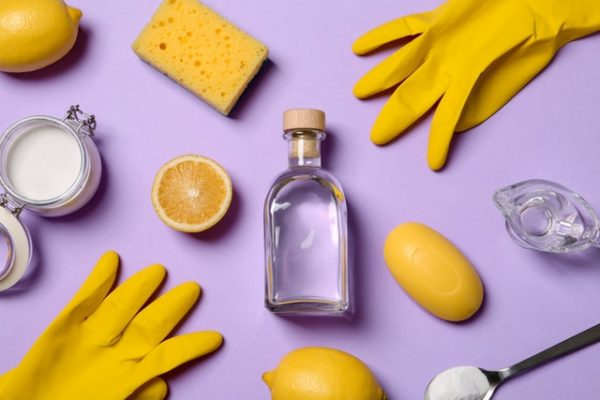With cleanliness a top priority, hand and home sanitizers have never been more in-demand… or unavailable. Yes, it seems grocery shelves across the country have been consistently cleaned out of all-purpose cleaners, bleaching products, and the like, leaving many scrambling, for ways to keep their homes as germ- and virus-free as possible. This also explains the rise in natural cleaning remedies like vinegar to fill the gaping holes in home upkeep. However, this begs the question: Does vinegar actually work and hold up against store-bought cleaning items?
Now to be clear, vinegar has not been reviewed or endorsed by The Environmental Protection Agency (EPA) or Centers for Disease Control and Prevention (CDC) as an effective solution for COVID-19 on surfaces. The EPA recently released a list of caronavirus-killing disinfectant products and the natural solution was notably absent (while Clorox and Lysol were endorsed). In a March 5 interview with ABC News, an EPA spokesperson said the EPA does not review other household products, such as vinegar, or whether they’re effective against viruses and bacteria.
That said, according to Dr. Alan Taege, infectious disease expert at Cleveland Clinic, vinegar should not be ruled out completely as a household cleaner — you just need to be aware of what it can and cannot do. “While many commercial disinfectants would likely be more effective, vinegar does have disinfectant activity,” he explains in an email to The Zoe Report. For the cleaning of tabletops and counters, Dr. Taege says the most commonly used form would be white vinegar, however others can work as well because they have acetic acid as a base as well. “Vinegar is acetic acid, which has the ability to destroy bacteria and viruses.” But, as the world is discovering quickly, not all bacteria and viruses are created equal, and natural disinfectants aren’t always able to thoroughly kill them all.
Although thorough research surrounding vinegar as a disinfectant is scarce, one study in 2000 by The University of North Carolina found that 6 percent vinegar was less effective than commercial household disinfectants in killing bacterias Staphylococcus aureus and E. coli (and needed at least 30 minutes of exposure to work). That said, another study in 2010 found that 10 percent malt vinegar could be useful in killing influenza viruses.
While the National Sanitation Foundation (NSF) does not comment on its ability in effectively killing viruses, the organization explains vinegar can surely hold its own as an everyday household cleaner — but if you want to disinfect, you’ll want to reach for something stronger. “If you want to disinfect — that is, effectively kill most bacteria — you may wish to use a disinfectant spray or cleanser that has directions for killing germs, or a bleach and water solution (one tablespoon of bleach in one gallon of water),” explains the NSF on its website.
If nothing else is available and you choose to clean with the natural agent, the NSF recommends combining vinegar with water in a 1:1 solution to clean and freshen surfaces like glass, windows, walls, cupboards, floors, sinks, stovetops, and coffeemakers. “Be cautious when using vinegar to clean surfaces with a high risk of food contamination, such as cutting boards and refrigerator shelves/drawers,” reads the NSF website. “To disinfect these areas, it is recommended to use a bacteria-killing bleach/water solution.”
If you think you’re showing symptoms of coronavirus, which include fever, shortness of breath, and cough, call your doctor before going to get tested. If you’re anxious about the virus’s spread in your community, visit the CDC for up-to-date information and resources, or seek out mental health support.



